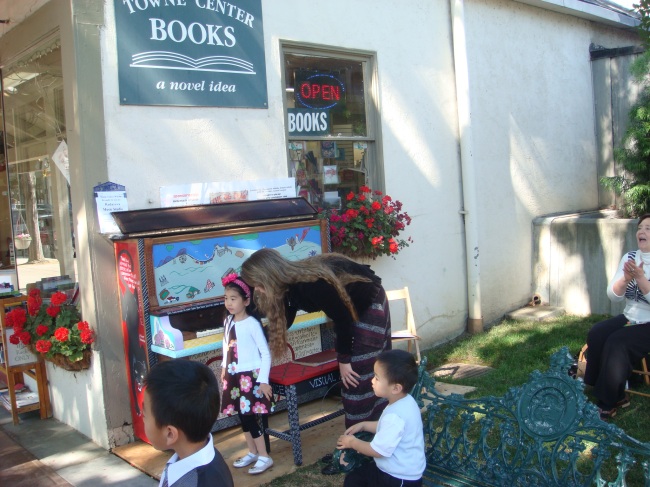 It was a picture perfect weather in downtown Pleasanton today. It was warm and clear sky when I arrived after nine AM to attend the Chalk Art festival. Me and a classmate carpooled, and we were lucky to find a nice parking spot right across the street from the event. The Main Street was buzz ling with people in festive mood, many were having breakfast outdoors, window shopping, or walking their cute puppies. Adding to the festive atmosphere was the backgroung music when we walked around to check out the restaurants and shops, we could hear the piano playing. Every block on Main Street, a painted piano was placed on the sidewalk so talented young children could showcase their skill playing the piano. There was also a live performance at the Firehouse Art Center during the event. The “chalk the walk” street, where anyone can buy a square for $20 and draw your art on the square was fun to watch. I also had the chance to talk to one of the chalk artists, and to my surprise, she told me that she had started painting the night before. Overall, it was fun seeing everyone’s unique talents on display. We took a lot of pictures throughout the event and posted it on Facebook.
It was a picture perfect weather in downtown Pleasanton today. It was warm and clear sky when I arrived after nine AM to attend the Chalk Art festival. Me and a classmate carpooled, and we were lucky to find a nice parking spot right across the street from the event. The Main Street was buzz ling with people in festive mood, many were having breakfast outdoors, window shopping, or walking their cute puppies. Adding to the festive atmosphere was the backgroung music when we walked around to check out the restaurants and shops, we could hear the piano playing. Every block on Main Street, a painted piano was placed on the sidewalk so talented young children could showcase their skill playing the piano. There was also a live performance at the Firehouse Art Center during the event. The “chalk the walk” street, where anyone can buy a square for $20 and draw your art on the square was fun to watch. I also had the chance to talk to one of the chalk artists, and to my surprise, she told me that she had started painting the night before. Overall, it was fun seeing everyone’s unique talents on display. We took a lot of pictures throughout the event and posted it on Facebook.
Dr. Yi hosted a lunch for us and it was fun. The whole class had that chance to sit down and relax, and just be funny. My only complain was my chicken Caesar salad lunch was not so great. But other than that, I had a great time with my classmates.
